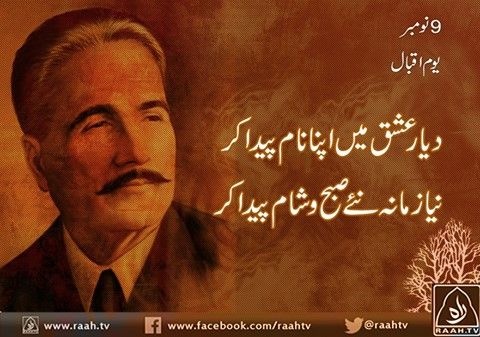
Muhammad Iqbal (1877-1938) is one of the preeminent writers of the Indo-Pakistan subcontinent. Indeed, the attention he has received from numerous writers, translators, and critics from Western as well as Islamic countries testifies to his stature as a world literary figure. While his primary reputation is that of a poet, Iqbal has not lacked admirers for his philosophical thought. He has in fact been called “the most serious Muslim philosophical thinker of modem times.” The frequently used appellation of “poet-philosopher” is thus well deserved. The hyphen in the phrase is all-important: Iqbal’s poetry and philosophy do not exist in isolation from each other; they are integrally related, his poetry serving as a vehicle for his thought. Iqbal wrote poetry in Urdu and Persian, and several collections in each language exist. In the following page a life-sketch of Iqbal is followed by a brief treatment of some of the major themes and literary features of his poetry.
Iqbal was born in Sialkot, in the present-day province of the Punjab in Pakistan, in 1877. He received his early education in that city, where one of his teachers was Mir Hasan, an accomplished scholar who commanded a knowledge of several Islamic languages. Mir Hasan gave Iqbal a thorough training in the rich Islamic literary tradition. His influence on Iqbal was formative. Many years later (1922), when the English governor of the Punjab proposed to the British Crown that Iqbal be knighted in acknowledgment of his literary accomplishments, Iqbal asked that Mir Hasan also be awarded a title. To the governor’s remark that Mir Hasan had not authored any books, Iqbal responded that he, Iqbal, was the book Mir Hasan had produced. Mir Hasan received the title of Shams al-’Ulama’ (“Sun of Scholars”).
For higher education Iqbal went to Lahore (1895), where he enrolled in Government College, getting, in 1899, an MA in philosophy; he had already obtained a degree in law (1898). In Lahore, a major center of academic and literary activity, Iqbal soon made a name for himself as a poet. One of the teachers of Government College Iqbal admired most was Sir Thomas Arnold. Arnold, too, had great affection for Iqbal, he helped Iqbal in his career as a teacher and also encouraged him to undertake several research projects. When Arnold returned to England in 1904, Iqbal wrote a touching poem in which he expressed his resolve to follow Arnold to England. The very next year, in fact, Iqbal left for study at Cambridge. His choice of Cambridge was probably dictated by the fact that Cambridge was reputed for the study not only of European philosophy but also of Arabic and Persian. In his three years of stay abroad, Iqbal obtained a BA from Cambridge (1906), qualified as a barrister at London’s Middle Temple (1906), and earned a PhD from Munich University (1908).
After returning to Lahore in 1908, Iqbal taught philosophy at Government College for a few years. In 1911 he resigned from government service and set up legal practice. Meanwhile he continued to write poetry in Urdu and Persian, Asrar-i Khudi (Persian) was published in 1915. Translated into English as The Secrets of the Self(1920) by Professor Reynold Nicholson of Cambridge, the book introduced Iqbal to the West. Asrar-i Khudi was followed by several other volumes: Rumuz-i Bikhudi (1918), Payam-i Mashriq (1923), Bang-i Dara (1924), Zabur-i ‘Ajam (1927), Javid Namah (1932), Musafir(1936), Zarb-i Kalim (1937), and Armaghan-i Hijaz (1938, posthumously). Iqbal wrote prose also. His doctoral thesis, The Development of Metaphysics in Persia, was published in 1908, and hisReconstruction of Religious Thought in Islam (with a 7th chapter added to the original set of six lectures, first published in 1930), in 1934. Many of Iqbal’s poetical works have been rendered into foreign languages, including English, German, Italian, Russian, Czechoslovakian, Arabic, and Turkish. His works have also spawned a vast amount of critical literature in many languages.
Although his main interests were scholarly, Iqbal was not unconcerned with the political situation of the, country and the political fortunes of the Muslim community of India. Already in 1908, while in England, he had been chosen as a member of the executive council of the newly established British branch of the Indian Muslim League. In 1931 and 1932 he represented the Muslims of India in the Round Table Conferences held in England to discuss the issue of the political future of India. And in a 1930 lecture Iqbal suggested the creation of a separate homeland for the Muslims of India. Iqbal died (1938) before the creation of Pakistan (1947), but it was his teaching that “spiritually ... has been the chief force behind the creation of Pakistan.” He is the national poet of Pakistan.



